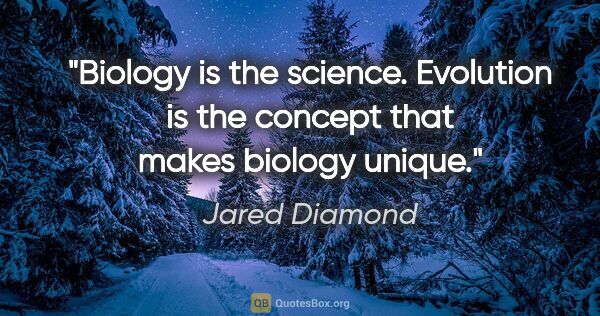Biological Science Quotes
What, unless biological science is a mass of errors, is the cause of human intelligence and vigour? Hardship and freedom: conditions under which the active, strong, and subtle survive and the weaker go to the wall; conditions that put a premium upon the loyal alliance of capable men, upon self-restraint, patience, and decision. And the institution of the family, and the emotions that arise therein, the fierce jealousy, the tenderness for offspring, parental self-devotion, all found their...
H. G. Wells
Science is the key to our future, and if you don’t believe in science, then you’re holding everybody back. And it’s fine if you as an adult want to run around pretending or claiming that you don’t believe in evolution, but if we educate a generation of people who don’t believe in science, that’s a recipe for disaster. We talk about the Internet. That comes from science. Weather forecasting. That comes from science. The main idea in all of biology is evolution. To not teach it to our young...
Bill Nye
Still, if history and science have taught us anything, it is that passion and desire are not the same as truth. The human mind evolved to believe in the gods. It did not evolve to believe in biology. Acceptance of the supernatural conveyed a great advantage throughout prehistory when the brain was evolving. Thus it is in sharp contrast to biology, which was developed as a product of the modern age and is not underwritten by genetic algorithms. The uncomfortable truth is that the two...
E. O. Wilson
A man may possess a profound knowledge of history and mathematics; he may be an authority in psychology, biology, or astronomy; he may know all the discovered truths pertaining to geology and natural science; but if he has not with this knowledge that nobility of soul which prompts him to deal justly with his fellow men, to practice virtue and holiness in his personal life, he is not truly an educated man. Character is the aim of true education; and science, history, and literature are but...
David O. McKay
The truth is that science started its modern career by taking over ideas derived from the weakest side of the philosophies of Aristotle's successors. In some respects it was a happy choice. It enabled the knowledge of the seventeenth century to be formularised so far as physics and chemistry were concerned, with a completeness which has lasted to the present time. But the progress of biology and psychology has probably been checked by the uncritical assumption of half-truths. If science is...
Alfred North Whitehead
What happens when an animal or person dies? Something seems to have departed--something like a vital spark that makes the difference between life and death. In the nineteenth century, philosophers believed that there really was such a thing and called it the lan vital, or vital spirit. But when twentieth century science began to unravel the mysteries of how living things work and reproduce, the idea was abandoned and people now accept that there is nothing more to being alive than complex,...
Susan Blackmore


